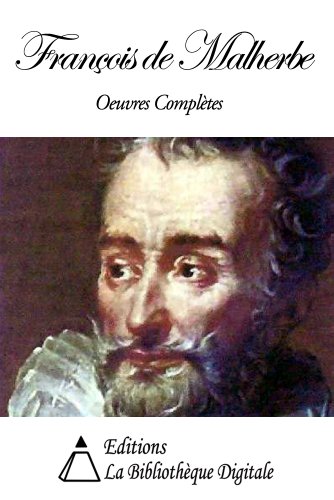Background
Francois Malherbe was born in 1555 in Cannes, France. The poet was the eldest son of another Francois de Malherbe.



(Oeuvres Complètes de François de Malherbe Poète français ...)
Oeuvres Complètes de François de Malherbe Poète français (1555-1628) Ce livre numérique présente les Oeuvres Complètes de François de Malherbe éditées en texte intégral.
http://www.amazon.com/gp/product/B0094LY32W/?tag=2022091-20
Francois Malherbe was born in 1555 in Cannes, France. The poet was the eldest son of another Francois de Malherbe.
Francois Malherbe's education took him to Paris, Basel, and Heidelberg.
At the age of twenty-one, preferring arms to the gown, Francois Malherbe entered the household of Henri d'Angouleme, grand prior of France, the natural son of Henry II.
He lived partly in Provence and partly in Normandy for many years after this event; but very little is known of his life during this period.
His Larmes de Saint Pierre, imitated from Luigi Tansillo, appeared in 1587.
It was in the year parting the two centuries (1600) that he presented to Marie de' Medici an ode of welcome, the first of his remarkable poems.
But four or five years more passed before his fortune, which had hitherto been indifferent, turned.
He was presented by his countryman, the Cardinal Du Perron, to Henry IV. ; and, though that economical prince did not at first show any great eagerness to entertain the poet, he was at last summoned to court and endowed after one fashion or another.
His old age was saddened by a great misfortune.
His son, Marc Antoine, a young man of promise, fell in a duel in 1626.
His father used his utmost influence to have the guilty parties (for more than one were concerned, and there are grounds for thinking that it was not a fair duel) brought to justice.
The lines of Boileau beginning Enfin Malherbe vint are rendered only partially applicable by the extraordinary ignorance of older French poetry which distinguished that peremptory critic.
These are the lines:-" Cependant leur savoir ne s'('tend nullement Qu'fi regratter un mot douteuse au jugement, Prendre garde qu'un qui ne heurte une diphthongue, Epier si des vers la rime est breve ou longue, Ou bien si la voyelle a l'autre s'unissant Ne rend point к l'oreille un vers trop langulssant. C'est proser de la rime et rimer de la prose.
"This is perfectly true, and from the time of Malherbe dates that great and deplorable falling off of French poetry in its more poetic qualities, which was not made good till 1830.
His own poetical work is scanty in amount, and for the most part frigid and devoid of inspiration.
The beautiful Consolation a Duperier, in which occurs the famous line-Et, rose, elle a v6cu ce que vivent les roses- the odes to Marie de' Medici and to Louis XIII, and a few other pieces comprise all that is really worth remembering of him.
His prose work is much more abundant, not less remarkable for care as to style and expression, and of greater positive value.
It consists of some translations of Livy and Seneca, and of a very large number of interesting and admirably written letters, many of which are addressed to Peiresc, the man of science of whom Gassendi has left a delightful Latin life.
(Oeuvres Complètes de François de Malherbe Poète français ...)
Francois Malherbe married in Provence in 1581.
